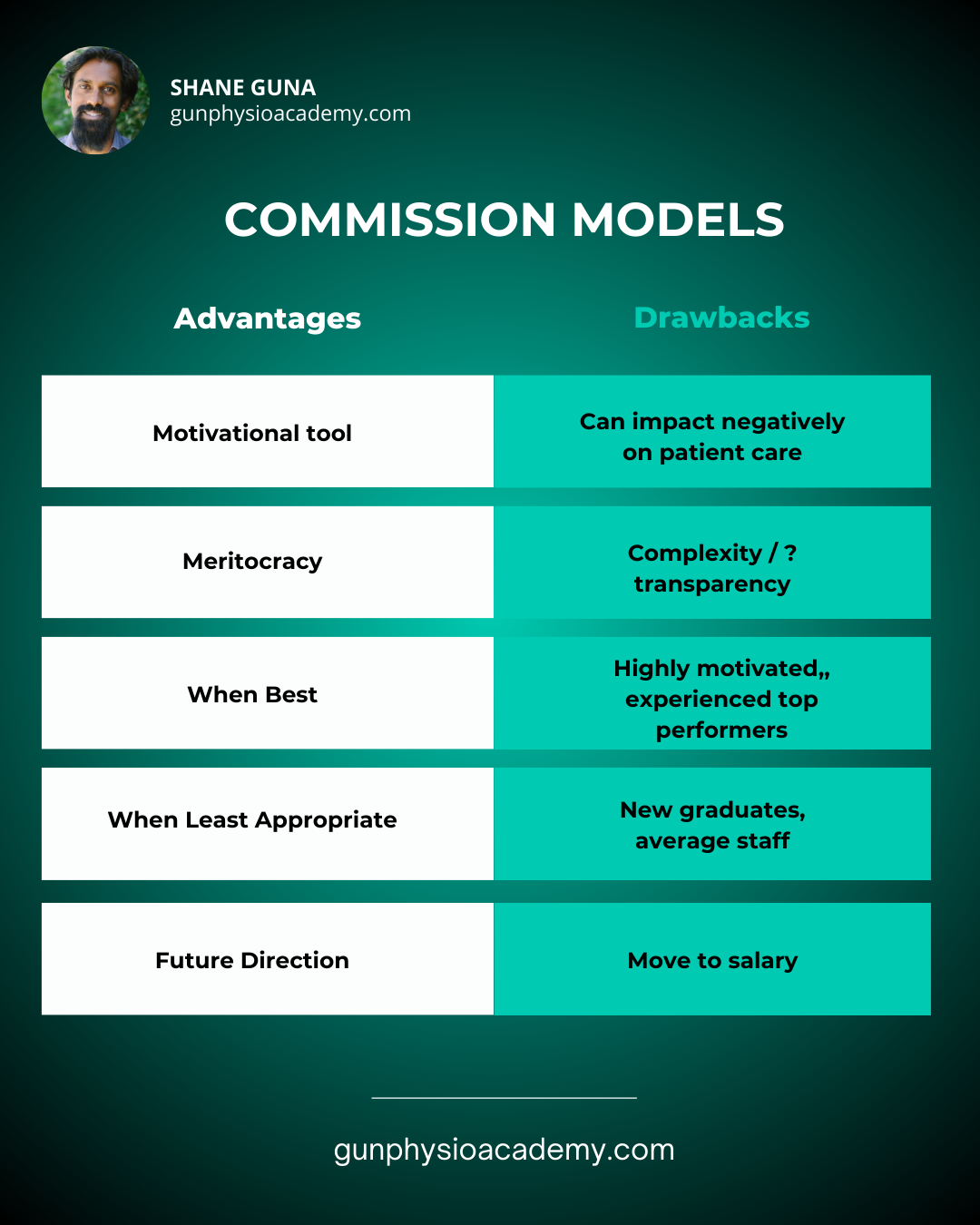The end of commission based physio pay is upon us.
The majority of your staff don’t want this.
It’s complicated, and very messy.
And most of all, it doesn’t work anywhere near as well as it used to.
Right now, having a variable salary is not a great option for anyone.
But before we zoom out to the economy (aka Albo’s investment properties), let’s have a look at how we got here.
Contractor agreements for physio pay
In vogue in the early days of private practice.
A time when patients were co-treated in multiple rooms in an old refurb.
This was physio in the 90’s, and continued in a similar vein into the early 2000’s.
Some are still here…
And this was where the concept of being ‘worth’ 40%, 45% or 50% came in.
Back when you might see 3 patients per hour as standard.
And in spite of fees being much lower, wages were actually quite good.
At least for those prepared to work in these sort of factory settings.
Fast forward 30 years and we have purpose built facilities.
We have private rooms and large gym spaces.
But we also have a workforce who don’t want to do things the old way.
The new way, is brilliant.
It’s patient centred and evidence informed.
But there’s one problem with the premium model, it’s expensive.
It doesn’t allow much room for anyone to falter.
Especially at a time where operating costs continue to skyrocket.
Watch your overheads
The biggest cost in your business is physio pay.
Your therapist wages are the biggest number on your P&L by a country mile.
Followed by rent and perhaps admin wages, super etc.
It’s for this reason that the latest IBIS report has labelled our profession as being:
“On thin ice”
IBIS report 2024
“Founded in 1971, IBISWorld provides trusted industry research on thousands of industries worldwide”
The latest report on the physio industry from May 2024 spoke to what we all very much know.
Wages have been rising at a much faster rate than revenue.
Next financial year, wages will likely increase by at least 4%, along with another 0.5% super increase.
And many clinics have been going sideways, if not backwards on revenue for some years now.
Losing staff at critical times.
Taking on junior therapists at higher wages.
Trying to stay afloat.
Hoping to avoid the cracks in the ice.
But like the Titanic itself, there’s a world of pain coming from beneath the iceberg.

Three reasons why physio pay needs to change
Here are 3 reasons why commission based pay needs to go.
1. It’s unpredictable
Commission based pay structures by definition involve variable salary.
At this point in time, when everyone is being squeezed from all ends.
Variability in salary is quite stressful.
It means if you’re sick, take leave or just have a down month, you get punished.
When the weight of the world is pushing you from pillar to post.
Being punished in your work for lack of performance leaves a very bad taste.
This is the reason so many physio’s leave private practice.
They aren’t prepared to cop variable salaries.
Not when most of their friends are out-earning them regardless.
And that instability eats away at them.
When they are forced to confront the raw numbers, it’s uncomfortable.
If you do this on a weekly or fortnightly basis, it can be completely toxic.
2. It lacks transparency
As much as we’d like it to be clear cut, it’s no longer possible to offer commission as a straight-up option.
If you’d like to know more about employee vs contractor agreements feel free to download the link below.
In the days of contracting, I’d argue that commission based pay was the FAIREST possible mechanism.
You literally got what you earned and no more.
You were in charge of your own involvement.
The pendulum has swung a long way the other way now.
And with all the bells and whistles involved, it’s become too complex.
- Sick leave
- Carer’s leave
- Annual leave
- Long service leave
- Ever increasing superannuation
Not to mention all the random things in the award such as annual leave loading.
This structure makes it very difficult to concurrently run a performance based pay scheme.
Consequently, many practices don’t do this well and get found out… eventually.
You would have to keep track of every inch to get this right.
And also present it in a way that is digestible for physio’s.
The reality is most staff simply don’t understand it.
The truth is most owners aren’t across the award at a way that they can confidently state they are meeting their minimum requirements.
They get by on saying things like, ‘you’re better off overall’, without any evidence to prove this.
And often, staff get stuck in no-man’s land.
They are potentially being underpaid and no one is the wiser for it.
Until they eventually get bitter about it, do the maths themselves and you get a call from Fairwork.
3. It hurts your business more than it helps
To this last point, it hurts your brand when people aren’t happy in their roles.
And when commission isn’t motivating them, they aren’t being stimulated to perform.
If it’s not helping, it’s hindering.
I found this with young staff in particular.
Getting it out of the way, providing stability, predictability and focus is key.
A physio’s primary focus should always be on serving the person in front of them.
Not worrying about whether they can pay their bills this week.
Everything changed after COVID, especially physio pay
I began killing commission in my business at the end of 2021.
I’d had enough of the complicated conversations, especially with new starters.
And I wasn’t able to hire ‘top performers’ at will.
We had to take whoever our best applicants were, as demand was outstripping supply.
I also felt the next cohort of physio’s were going to be a challenge.
Something about losing their key undergrad years to COVID…
And this has proved correct in many ways.
New starters moved to agreed salaries.
Negotiations were open and feedback was regular.
I was however across my numbers, good at marketing and most of all, I was obsessed with client experience.
We spent an afternoon a week on ‘soft skills’.
You have to train therapists to perform and be comfortable in this space.
Giving feedback is key.
Rewards can come later, most young staff just want to find their feet initially.
Granted, some need the odd carrot here and there.
It’s not a simple change, transitioning out of commission.
It’s quite possibly more complicated than running a broken system itself.
But it’s the first step towards a sustainable model for your business.
If you’d like to know more about how you can make this happen, by all means feel free to jump on a call with myself.
Horses for courses
Owners ought to be flexible with what options you have on the table.
And capable of changing them.
Because people change.
If you can keep your staff engaged, then perhaps you can see the rewards from this process too.
Reward and punishment based measures are only good for certain people.
It’s a way of maintaining authority in a vertical structure.
Gen Z don’t want vertical structures.
They want horizontal structures.
Organisations in which they can stretch their wings.
Talk to anyone as an equal.
Live in a society based more around equality and fairness than around authority and control.
Reward based structures give off a certain smell to the youth.
They know they’re getting played.
Even when they aren’t…
That’s why they’re always on the front foot nowadays.
It’s a different time and young people won’t tolerate being taken for a ride.
Transparency is key
The only transparent form of physio pay is one where you know EXACTLY what you’re getting.
Now, before you @ me, I’d acknowledge that for many clinics this is probably working quite well.
If you have seasoned staff, established clients and are pricing adequately.
Then by all means, continue what you are doing.
But if you are a new clinic, or have been through a state of flux recently.
OR you have a young team, perhaps struggling to manage.
Flirting with the ups and downs of cashflow, then I’d say this is worth pondering.
A commission structure doesn’t help many.
It’s no longer in vogue to offer variable salary to young staff.
And many young physio’s will continue talking with their feet about this.
Do your staff a favour by being a source of stability in their life.
That’s what great leaders do for their people.
Creating diverse physio practices,





